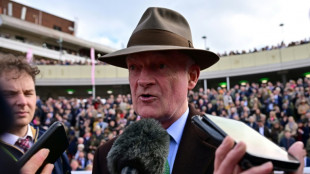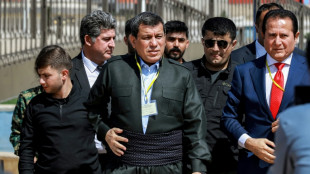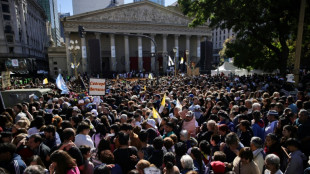-
 'Legendary' Eubank Jr beats Benn in grudge bout
'Legendary' Eubank Jr beats Benn in grudge bout
-
Thunder sweep past Grizzlies into NBA playoffs 2nd round, Cavs on brink

-
 South Korea's Ryu and Japan's Saigo share LPGA Chevron lead
South Korea's Ryu and Japan's Saigo share LPGA Chevron lead
-
Canada leaders make closing pitches in campaign upended by Trump

-
 De Bruyne's Man City exit 'so difficult' for Guardiola
De Bruyne's Man City exit 'so difficult' for Guardiola
-
'No regrets' for Amorim over Man Utd move

-
 Lyon and Strasbourg win to close in on Europe, Montpellier relegated from Ligue 1
Lyon and Strasbourg win to close in on Europe, Montpellier relegated from Ligue 1
-
Toulouse thrash Castres as Top 14 pursuers stumble

-
 Djokovic crashes to nervous Arnaldi in Madrid opener, Swiatek advances
Djokovic crashes to nervous Arnaldi in Madrid opener, Swiatek advances
-
Olympic champs Russell, Davis-Woodhall win at Drake Relays

-
 Browns end Sanders long draft slide
Browns end Sanders long draft slide
-
Cavs crush Heat, on brink of NBA playoff sweep

-
 Fire rages after major blast at Iran port kills 8, injures hundreds
Fire rages after major blast at Iran port kills 8, injures hundreds
-
Kiwi Beamish wins Penn Relays 1,500m crown with late kick

-
 Mbappe on Real Madrid bench for Clasico Copa del Rey final
Mbappe on Real Madrid bench for Clasico Copa del Rey final
-
England survive France fightback to seal Women's 6 Nations slam

-
 Palace sweep past Villa to reach FA Cup final
Palace sweep past Villa to reach FA Cup final
-
CAF appoint Moroccan Lekjaa first vice-president

-
 Major blast at Iran port kills 5, injures hundreds
Major blast at Iran port kills 5, injures hundreds
-
Rodgers vows to stay with Celtic after fourth successive Scottish title

-
 Ipswich relegated as Newcastle, Chelsea boost top five bids
Ipswich relegated as Newcastle, Chelsea boost top five bids
-
Canada leaders make final pitches in campaign upended by Trump

-
 Mullins -- Ireland's national training treasure
Mullins -- Ireland's national training treasure
-
US, Iran say progress in 'positive' nuclear talks

-
 Mullins emulates O'Brien with second successive trainer's title
Mullins emulates O'Brien with second successive trainer's title
-
Ipswich relegated after one season in Premier League

-
 Just Stop Oil activist group holds final march
Just Stop Oil activist group holds final march
-
Djokovic crashes to nervous Arnaldi in Madrid opener

-
 Syria's Kurds demand 'democratic decentralised' Syria
Syria's Kurds demand 'democratic decentralised' Syria
-
Leverkusen win to delay Bayern and Kane's title party

-
 Buenos Aires farewells native pontiff with tears and calls to action
Buenos Aires farewells native pontiff with tears and calls to action
-
Turkey's opposition says Erdogan's canal plan behind latest arrests

-
 Maresca hails 'nasty' Chelsea as top five bid stays alive
Maresca hails 'nasty' Chelsea as top five bid stays alive
-
Trump raises Putin doubts after Zelensky talks at pope's funeral

-
 Major blast at Iran port kills 4, injures hundreds
Major blast at Iran port kills 4, injures hundreds
-
Napoleon's sword to be sold at auction in Paris

-
 Iran, US discuss nuclear deal in third round of talks
Iran, US discuss nuclear deal in third round of talks
-
Buenos Aires farewells native pontiff with call to action

-
 Warholm sets hurdles world record at Diamond League, Holloway shocked
Warholm sets hurdles world record at Diamond League, Holloway shocked
-
US students 'race' sperm in reproductive health stunt

-
 Wikileaks founder Assange joins crowds for pope funeral
Wikileaks founder Assange joins crowds for pope funeral
-
Leader Marc Marquez claims Spanish MotoGP sprint victory

-
 Celtic win fourth successive Scottish Premiership title
Celtic win fourth successive Scottish Premiership title
-
Jackson ends drought as Chelsea boost top five push

-
 Warholm sets 300m hurdles world record in Diamond League opener
Warholm sets 300m hurdles world record in Diamond League opener
-
Major blast at south Iran port kills 4, injures hundreds

-
 Russia says retook Kursk from Ukraine with North Korean help
Russia says retook Kursk from Ukraine with North Korean help
-
Francis laid to rest as 400,000 mourn pope 'with an open heart'

-
 Trump, Zelensky meet on sidelines of pope's funeral
Trump, Zelensky meet on sidelines of pope's funeral
-
'Shared loss': Filipino Catholics bid Pope Francis farewell

US Federal Reserve with “announcement”
In a widely-followed press conference, the US Federal Reserve (Fed) announced a significant economic contraction in order to control the growing risk of inflation in the United States. With this decision, the central bank is reacting to persistently high rates of inflation and a rapidly changing economic situation. At the same time, the measure sends a signal to companies and financial markets: after a phase of historically low interest rates and extremely loose monetary policy, the course could now change in the direction of a more restrictive phase.
Rising interest rates and tighter monetary policy:
Contrary to the course of recent years, when the Federal Reserve supported the economy with low interest rates, the focus is now on interest rate hikes and a reduction in the Fed's balance sheet. This is intended to dampen excessive demand, slow credit growth and contain inflation. Fed Chairman Jerome Powell emphasized that these steps are necessary to ensure sustainable and stable economic development over the medium term.
Market analysts see the announced contraction as a significant policy shift. Many investors had already expected interest rate hikes, but the clear focus on a restrictive policy exceeded the expectations of some observers. As a result, stock markets came under short-term pressure and the US dollar depreciated slightly against other leading currencies.
Background: Inflation and economic uncertainties:
The rate of inflation in the US has reached record levels in recent months. Supply bottlenecks, rising energy prices and high consumer demand had noticeably driven up prices. In addition, numerous economic stimulus packages initiated in response to the coronavirus crisis have stabilized the economy, but have also led to a high amount of money in circulation.
With the announcement of an economic contraction, the Fed is seeking a balance: on the one hand, price stability and a reduction in speculative bubbles should be ensured, while on the other hand, the Fed wants to avoid an excessive cooling of the economy. Jerome Powell emphasized that developments are being monitored closely and that the Fed is prepared to take action if necessary.
Impact on companies and consumers:
A more restrictive monetary policy primarily affects companies that have relied on cheap credit. For firms that finance growth through debt, costs could now rise, which could slow investment and expansion in some sectors.
Consumers are also likely to feel the effects of rising interest rates, especially real estate buyers and credit card customers. Higher mortgage rates could put the brakes on the residential real estate market and make buying a home more expensive.
At the same time, however, there are also positive aspects: an effective fight against inflation preserves the purchasing power of the population and can reduce speculation risks. In particular, people with savings could benefit from higher interest rates, provided that financial institutions adjust their rates.
Criticism and outlook:
Not all experts consider the Federal Reserve's move to be appropriate. Some critics warn that curbing growth too quickly could jeopardize new jobs and slow down the economic recovery after the pandemic. The fear is that if the US economy cools more sharply than expected, the labor market could deteriorate again and high inflation could only moderate moderately.
Nevertheless, many experts see the decision as overdue. In view of record inflation and a stock market environment that is overheated in some areas, there is a need for action to stabilize the fundamental data again. The coming months will show whether the US economy can strike a balance between stabilizing and avoiding a recession – or whether a more severe downturn is looming.
Conclusion:
The Federal Reserve has sent a clear signal to markets and consumers with its announcement of an economic contraction. Higher key interest rates and a tighter monetary policy should curb the record inflation and enable a more balanced economy. At the same time, there are risks for growth and the labor market if the economic environment deteriorates more quickly than expected. It remains to be seen whether this balancing act will be successful, but it is clear that the latest step marks the beginning of a new phase in US monetary policy.

China Strikes Back: Tariff War

Spain: China's Gateway to Europe

Europe's Economic Self-Sabotage

Trump fails due to Russia's tough stance

Pope Francis: A Transformative Legacy

Portugal: Living Costs Soar

Is Australia’s Economy Doomed?

DOGE Fails to Slash U.S. Spending

Slovenia’s Economic Triumph

Next Generation EU a scam?

Can Poland Rescue Europe?



